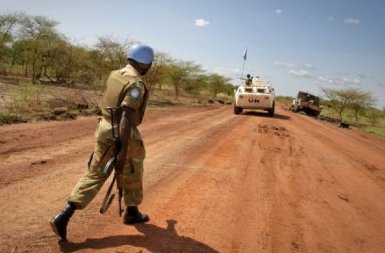Official warns against looming Sudanese army attack in Abyei
March 17, 2014 (JUBA) – South Sudan alleged on Monday that the Sudanese army (SAF) and their armed militia are planning to invade and take control of the contested border region of Abyei following repeated attempts to breach a buffer zone.

General Kuol Monyluak accused SAF of collaborating with elements of armed members of the Arab Misseriya tribe and allied militia under the command of Thomas Thiel in repeated attempts to cross the buffer zone created by the United Nations Interim Force for Abyei (UNISFA).
He said UN peacekeeping forces remained on high alert, having already foiled two attempts to attack the area from different directions over the past few days.
“They (SAF) came last week but they were repulsed. This is a clear violation of the agreement over the status of the area and the government of Sudan must accept responsibility for the consequences of what will happen,” he said.
Justice Deng Biong, a senior South Sudanese government official assigned the file of the Abyei area by president Salva Kiir Mayardit, also confirmed in a separate interview with Sudan Tribune on Monday that Sudanese forces had made two separate attempts to cross the buffer zone.
“They attempted about four days ago to cross the buffer zone from the west and east of Abyei but the United Nations Interim Force for Abyei foiled it,” he said.
Monyluak, who represents the Abyei Joint Oversight Committee (AJOC) in the area, slammed Sudan’s “unacceptable behaviour”, saying the people of Abyei would “never tolerate any attempt or threats to illegally occupy the area”.
POLITICAL PLOY
The official said statements by Khartoum about the presence of unspecified armed groups in the area were nothing more than a political ploy to cover up what is occurring on the ground.
“The officials in the government of Sudan behave like a child which bites the hand of another person and started to cry to draw the attention of the family before the victim of the bite responds. This is what they have been doing in Abyei. They attack, killed and then claim there are armed groups in Abyei,” said Monyluak, who claims the Sudanese army has been preventing supplies from reaching the area’s residents since 2011.
The attack on Abyei three years ago came just ahead of South Sudan’s secession from Sudan in July 2011, as part of a 2005 agreement between Khartoum and South Sudan’s rebel movement turned ruling party (SPLM).
Abyei is strategically important to both nations not only for its oil, but also for its fertile agricultural land. Much of the Sudan-South Sudan border is disputed and remains un-demarcated since South Sudan’s independence.
HISTORICAL DISAGREEMENT
Juba claims that Sudan is trying to forcefully settle members of the Khartoum-aligned Misseriya tribe in the hopes this would block any attempt by its Ngok Dinka residents to return the area to the South from where it was transferred to the Kordofan region in central Sudan in 1905 during the colonial era.
The status of Abyei was addressed in the 2005 Comprehensive Peace Agreement (CPA), but a planned referendum to decide the future of the region never went ahead due to disagreement over who would be eligible to vote.
Khartoum wants the Misseriya, who enter the area with their cattle for part the year, to participate, whereas Juba maintains that under the deal only those permanently residing in the area are eligible to take part.
After waiting almost three years for agreement between Khartoum and Juba over their plebiscite the Southern-aligned Ngok Dinka held a unilateral vote in October last year in which they almost unanimously opted to join South Sudan.
The voting result was dismissed by Khartoum and downplayed in Juba as the South Sudanese government did not want to jeopardise its renewed ability to export its oil through Sudanese territory.
(ST)
